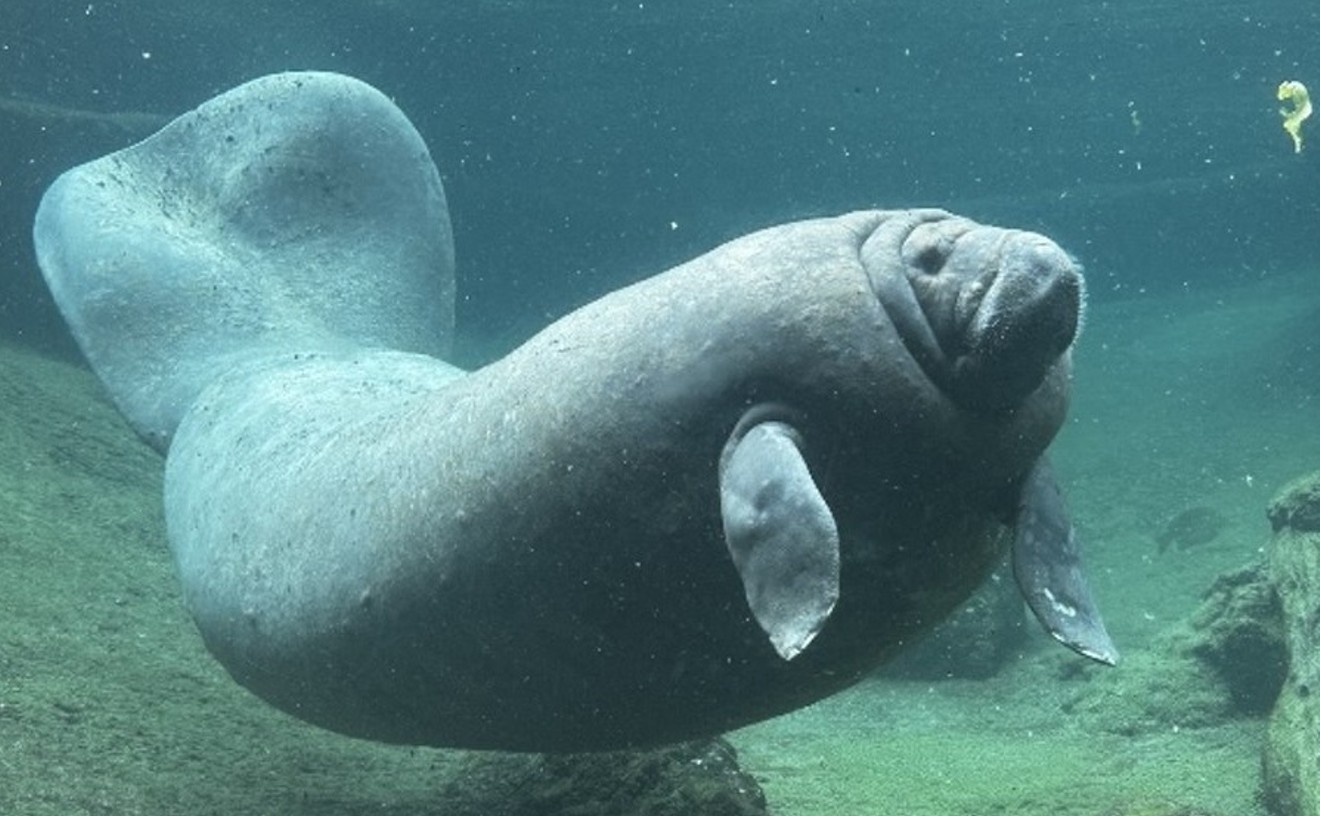Yet recently he's been accused of "desecrating sacred memories" on England's staid BBC. France's influential daily Le Monde cited a "Scandal in New York" after Big Apple Mayor Michael Bloomberg termed Barham's most recent project "disgraceful and despicable." And a newspaper in upstate New York opined that Barham "symbolizes the worst aspect of the entrepreneurial spirit."
What's it all about? Earlier this month, Barham began peddling "Heroes, 9/11/01" -- a set of 202 trading cards featuring victims of the World Trade Center tragedy, the firemen and dogs who searched the wreckage for them, anthrax, and American flags. There's even a fifteen-card puzzle that pictures the towers collapsing.
Collect 'em all, kids.
Most of the set, for sale at www.sportscardswholesale.com, pictures the people who perished on September 11. The captions aspire to serious homage but generally offer only overheated, lowbrow twaddle. Take, for instance, this pearl of prose from the back of a 2.5-by-3.5-inch card featuring an ancient photo of a Trade Center victim in a wedding dress: "Like the Cyndi Lauper song, Girls Just Wanna Have Fun, Florence Cohen retained a zest for life's adventures and pursued them to their fullest. Whether curled up with an engrossing novel or traveling abroad, Florence made sure she had a good time."
They go, retail, for $2.50 a pack. Eight cards included.
It's not just crackpot capitalism, Barham ventures. Survivors will get eight percent of the proceeds. "When I first started calling the families of World Trade Center victims and explained I wanted to honor their loved ones in a baseball-card format, six of every seven people slammed the phone down, usually after saying, 'Fuck you' or 'You're an idiot,'" he recounts. "Once they get a look at the cards, though, those people do a 180. They tell me how wonderful the cards are."
Dozens of stories have been printed about him, and he's done about twenty interviews on CBS, CNN, MSNBC, and other networks. Most of these reports have proceeded the same way. "Tasteless and disgusting," say some survivors. "We're honored," reply others. "I don't call it a trading card, I call it a tribute card," Barham himself concludes, "a magazine in a baseball-card format."
Barham has received less play in the South Florida press than he has with television or newspapers outside his home base. The Miami Herald, for instance, recently published a story borrowed from another paper on its lifestyle page. The Sun-Sentinel did a single, local piece a while ago.
The day after the cards actually began selling over the Internet, Barham welcomes two visitors to the two-bedroom house on Federal Highway where he sleeps and sells. It is literally stuffed to the rafters with boxes full of the cards. The man whom the New York Post termed a "WTC Card Shark Sicko" offers his guests fresh cookies. His black Labrador, Moose, slobbers on them in friendly fashion. He wears a blue dress shirt and black running shoes. His manner is nervous, his blue eyes intent. "Yesterday was the first day and we sold $20,000 of the cards," he says after opening the door. "That's how well we're doing."
Soon he is referring to the anchors and commentators who have assailed his enterprise as "drunk" (the New York Post's Steve Dunleavy) and "idiots" (Fox News's Bill O'Reilly and MSNBC's Dan Abrams). "They put you in this little room and then they point a camera at you and then they start attacking," he says. "It's stacked against you. You have to come up with a bright response."
Barham says he was born in Manhattan and grew up all over the world -- in Chicago, Jamaica, and Denmark -- because his dad was a mattress salesman who traveled a lot. He became an Eagle Scout, attended the University of Miami, graduated in 1975, and then moved to the San Francisco Bay area, where he says he spent most of the next twenty years. Chestnut Publications, his company, is named for the street he lived on in San Fran's Marina District.
It was in the Bay Area, while Barham was working as a stockbroker, that a client named Dwight Randolph gave him the big idea of selling unconventional trading cards. Such memorabilia, particularly vintage baseball cards, brings in millions from kids and collectors. Collectible cards were branching out back then; Barham recalls seeing trading cards of Corvettes, fire engines, even farm implements. "It was a $2.5 billion business in the early 1990s," he says. "Opportunity!"
It didn't work out the way that Barham planned. He says he and a friend from Houston invested half a million dollars. Though handsome cards picturing vintage motorcycles like a 1913 Indian Twin were issued in 1993, sales were disappointing. He says Harley-Davidson double-crossed him after he called the company to report his plans as a courtesy. "They put together their own cards and sold 400 million cards in no time," he fumes. "It really put a damper on my business."
San Francisco court records show that his landlord at the time, the Woo Family Trust, sued to make him pay $900 in rent in June 1993. Though the dispute was settled a couple of months later, Woo won a judgment of $6818 against him in September 1995. Around the same time, an outfit called KFH Land Company sued Barham in county court in San Francisco, demanding $25,584. Barham defaulted. (Barham says the Woos were after him because he led a rent strike over poor living conditions and "I just walked away from it." He has no idea what the second judgment was about.)
But that was only the beginning of his problems. In 1995 and 1996, Barham issued a series of trading cards featuring marijuana. They pictured California Red, Sri Lankan, Afghani ... you get the idea. The buds look tasty. The prose? Well, how's this: "It has become a cliché in our times that Marijuana should be made legal and taxable.... If the alternative amounts to a police state and/or police state mentality, then we must do something soon to change the status quo and the direction in which we as a society are going. We appear to be evolving into a circumstance that will be increasingly difficult to reverse."
He claims he sold 35 million pot cards. "Head shops and hippies, that was my market," he says. "Then Tower Records began selling them."
Even so, Barham's financial fortunes didn't improve markedly. In 1996, after he moved to Berkeley, his landlord tried to evict him for unpaid rent. Barham made out an $83 check to the court. It bounced. In February 1997 a $6800 judgment was entered against Barham and his roommate.
In 1998 Barham came up with yet another brilliant collector-card idea: tattoos and body piercing. He called tattoo shops around the country, gathered pictures of some of their weirdest creations -- think black-and-white-striped buttocks -- and assembled prototypes. From a card: "Tattoo Piercing and Body Modification appear to be an individualistic response to an increasingly conservative and predictable culture."
"These didn't hit the market that well," says Barham. "I got out of the business."
No wonder. In 1998 the State of California placed a lien against his property for $3500 for unpaid taxes. The next year the state added $21,100 more. And in May 2001 California filed a lien against Barham for $53,000. According to the state department of revenue, his company, InLine Cards, hadn't filed a state tax return since 1992 and can no longer do business in California. Barham blames any problem related to income tax on his accountant, who he says is now out of business. "I don't know what happened since I left California," he shrugs. "I never took any money from anyone, nor have I done anything dishonest."
Barham says he moved back to Key Biscayne in 1998. He worked for a time as a stockbroker. When his mother became ill, he moved north to Delray Beach to be near her. That move, as it happened, didn't pan out very well either.
In March 2000 he was quoted by a Topeka, Kansas, newspaper as one of 30,000 "independent marketing associates" for a company, Renaissance: the Tax People, that was then under federal investigation. This past April federal prosecutors charged one top employee with being part of a conspiracy that defrauded the public of $100 million. Barham was not accused of participating in the misdeeds, which prosecutors have called a pyramid scheme.
A company he formed in March 2001 to match accountants with clients, Professional Referral Services, didn't do very well either. When his landlord tried to evict him in July 2001, he penned a pathetic, error-ridden letter to the judge pleading for time. "Our business projections fell perilously below the targets we believed could reasonably be reached.... Dispute the 80 plus hour week efforts ... we have fallen seriously behind in our rental payments.... Never the less, we believe we have discovered the error of our ways."
Barham eventually signed over to the landlord a property he owned west of Homestead, and so managed to keep a roof over his head.
Then came the idea for the 9/11 cards, which he believes will dig him out of his financial morass. He says it occurred to him just days after the World Trade Center disaster.
Despite opposition from friends and family, he raised the $250,000 he thought would be needed. Some of the money is his own. There are three other investors.
The torrent of press and TV coverage he has received for the project is certainly the kind of publicity most rascals like Barham only dream of. He was called "ghoulish" on CNN Live. Articles questioning his project have appeared in France, Spain, and throughout the English-speaking world, including New Zealand and Australia. Ken Paulson, executive director of the First Amendment Center, took Barham a bit too seriously: "Meaningful content can appear in many forms, including small slabs of cardboard. The First Amendment protects free speech, regardless of the format. In the end, it's about the message, not the medium."
Criticism of a different sort came from Karyn Ricke, a Lake Worth graphic artist who sued Barham after she provided a design for the cards and he refused to pay. This past October, after Barham didn't show up in court, a judge awarded her $3000 in damages. "I don't know if this guy has a pot to piss in," says her lawyer, Scott Chapman. "A lot of people are probably after his assets."
Despite all the press, it seems most likely that Barham's 9/11 escapade will fail miserably and business associates will be left holding the bag, as they have been in the past. At least one investor, though, isn't particularly bothered by the prospect of losing money. Bill Healey, who lives in San Francisco, says he has plowed more than $25,000 into the project. He doesn't believe it's in bad taste, pointing out that these aren't really trading cards. "I probably put in the first $25,000 because Kingsley is a friend," Healey says. "He has had a pretty tough time of it in the last twenty years, I'd like to see him have some security."
Barham insists his tawdry record has no bearing on the 9/11 project. He contends that a chain of grocery stores in Pennsylvania and northern New Jersey recently agreed to sell the cards. And they are doing well on the Internet. "There is no question that I have gotten some bad advice, but I've never set out to harm or hurt or financially wound someone," he concludes. "Most of the people who have been hurt by me have been worth a lot of money."











